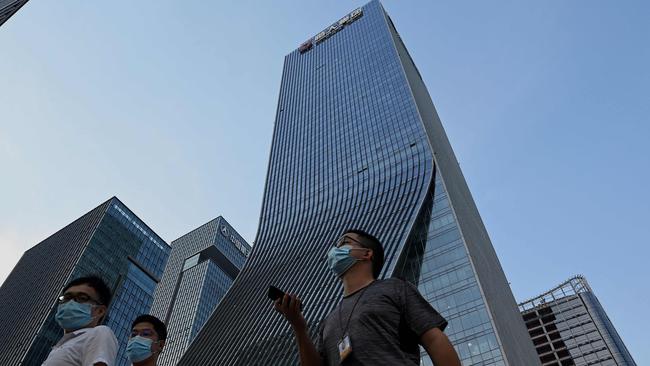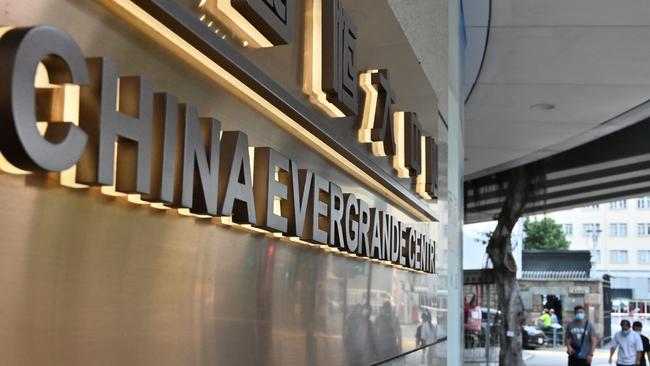Evergrande collapse will be one for the ages

To be clear, the gargantuan Chinese property developer is not bust, or at least not yet.
But it looks close to reaching the point of no return – the chapter when the creditors are howling, rating agencies downgrading as fast as they can, and even the company is admitting it might not survive.
Its Hong Kong-listed shares dived a further 10 per cent on Monday and have now lost 93 per cent of their value since the high point in 2017. The next few days could be pivotal, with the company having to find $US84m to pay interest on a bond this Thursday.

It has been a common enough story of breakneck expansion, leverage and hubris.
Xu Jiayin founded the company in 1996 and it grew like crazy on the back of the liberalisation of residential property in China and the dream of hundreds of millions of Chinese to own their own home.
Dozens of developments sprang up in every Chinese city. With property prices rising year after year, people were confident enough to pay deposits on homes that were nothing more than lines on an architect’s drawing board.
Evergrande also borrowed heavily from banks and issued junk bonds to get the developments off the ground.
At the same time it went on a gigantic diversification spree, expanding into areas where it had no expertise whatsoever, including fizzy drinks, video streaming, pig farming, solar panels and electric cars. It also owns a football team, Guangzhou FC.
It now has 1300 developments, 200,000 staff – and liabilities of no less than $US305bn.
According to a Capital Economics estimate, its pre-sale liabilities are “equivalent to roughly 1.4 million individual properties that it has committed to complete”. That boggles the mind. More than a million homes and apartments that need either building from scratch or at least final plastering, kitchen-fitting and so on just to honour promises already made to purchasers, some of whom have already paid in full or in part.
Karen Li, 37, from Shenzhen, says she paid the full purchase price of 1.4 million yuan (about $295,000), three years ago for a 400 sq ft apartment in one of its high-rise developments. She was notified last month that construction had been delayed.
“I thought it was reliable because it was a major corporation,” she told The Wall Street Journal. “For each ordinary family, this is a disaster.”
It’s not just the army of prospective homeowners who are furious and anxious. Suppliers and contractors descended on the Evergrande head office last year to protest about the non-payment of their invoices.
Li Gexin, the manager of a janitorial company in Qingdao, employed 200 workers who have cleaned Evergrande’s sales offices for a year and were owed more than $US300,000.
“If we don’t get the money, we can’t eat,” Li told The Los Angeles Times.
With no spare cash, Evergrande has resorted to offering to pay suppliers with assets like half-built flats or parking spaces.
Financial markets are not especially bothered by the immediate human misery, nor even the risk that banks and bondholders might have to write off a few billions of dollars. What rattles them is the possibility the Evergrande debacle is signalling a much greater systemic issue.
Charlie Robertson at Renaissance Capital wrote that the saga meant Beijing, now more than ever, had to make the right policy choices.
“I’m not worried by Covid, I’m not worried by transitory inflation, gas price squeezes or logistic problems that look like they’ll continue into 2022. But this concerns me,” he said.
Jens Nordvig of Exante Data, which advises institutional investors, has warned that the residential property market in China could be heading for a significant price fall, with a profound impact on consumer confidence and economic growth in the country.
He points to the huge supply of new residential property space built in the past few years.
China is now very close to having as much square footage per capita as a more developed country such as the UK.
Then there are the very high vacancy rates in China, coupled with high prices.
In cities such as Beijing, Shanghai and Shenzhen property values are “very extreme” relative to average incomes. Income multiples there are in the 30-45 times range, which compares with less than 15 in London and less than 10 in New York.
Most of the rest of China’s property developer sector is not much less leveraged than Evergrande, and just as much reliant on selling off-plan – which accounts for 90 per cent of all new homes in China. There have been sharp falls in other developers’ share prices in recent days.
There are good reasons why Beijing should be able to contain this. The central bank wants to see controlled deleveraging in the property market.
It was the People’s Bank of China’s new “Three Red Lines” policy last year that forced developers such as Evergrande to degear in the first place. It will be perfectly content to see some steam released from the overheated market property and for Evergrande stockholders to be wiped out.
But it won’t want the wider industry to plunge into a disorderly panic and certainly won’t want the contagion to spread to other sectors.
Investor unease was reflected in everything from insurance company shares to the price of iron ore. So the authorities will make sure the state-controlled banks keep lending to other sectors even if property takes a hit. That’s the theory, anyway.
But this is a delicate test for Beijing. And, by the way, for Prudential, the British insurer that has picked a challenging moment to be trying to raise £2bn in Hong Kong.
The Times




Evergrande is shaping up to be one of the great corporate collapses of modern times. Maybe not quite up there with Lehman Brothers, but certainly on a par with Enron and potentially far more costly and disruptive.